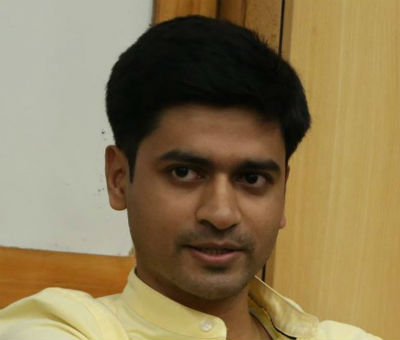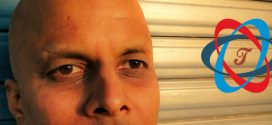Hi friends,
Recently we got a chance to get in touch with Tuhin Harit, an engineer by profession and an author by passion. Born in a middle-class family in western Uttar Pradesh, India; Tuhin always had a special corner in his heart for the people he saw doing their best but still not getting their dues. It is easy to find a rikshewala and use his services in the major parts of the countries, but it is rare that passengers care to recognize them. This made him write his first book revolving around the life of a rikshewala. And, it has resulted in a book named Mannu Rikshewala. You can read detailed reviews for the same at:
Mannu Rikshewala by Tuhin Harit | Book Reviews

Tuhin Harit – Author of the book – Mannu Rikshewala
On behalf of Team ThinkerViews I got a chance to have a small interview session with him and here it is for you all.
Thank you for the kind words. It’s really heartening when your efforts are appreciated
As you rightfully said, I belong to a middle class family from North India. I did my engineering from IIT Roorkee in 2009. I’m an investment banker by profession. And am also an MBA. So you can say, I’ve checked all those boxes of that beaten to death cliche.
Honestly, I feel I’m still searching for my passion. Writing is definitely something I feel I can just do and get lost in. I’m also a fitness enthusiast and do martial arts and long distance running. I also sketch sometimes. I just feel life is too short and we should try something that challenges us. We should try to come out of a mold that we all create around ourselves, that we are this kind of person. No! we’re not any kind of person. We’re just body and flesh which is capable of thinking and experiencing stuff. So let it be.
You know this gets asked from me, and so I’ve come to ponder over this question. And honestly, I think I am not a writer, or at-least Mannu Rikshewala was not my creation as a writer. It’s my vindication about everything I’ve always wanted to say but couldn’t, perhaps because I didn’t had the courage, or maybe I didn’t knew how. It’s my shout to the world, that please write and read more of such sensible text, or what I find sensible.
In a way, you can say, it is those rikshewalas who I saw everyday at my hometown who inspired me to write. Mannu Rikshewala was my shout to people around me, for whom rikshewalas seemed invisible, who would spend wasteful sums of money on parties or cars, for example, but would close the shades whenever they’d see a beggar. I’m not trying to take a high moral ground here, or saying that you should pay a beggar, but my point is that they need to stop living in their shell, stop acting as if they’re owed something. They have to accept, to put it bluntly, that they’ve been incredibly lucky that they were not born on the street, like Mannu and so many others like him.
Another thing which has always pained me, is women molestation cases. I pain to think, or mostly avoid thinking, what would I do if this happens to some girl I know or who is dear to me. So Ankita’s journey had been etched by me, as a way to face that fear and make others face them as well.
Apart from these moral reasons, I also always wanted to write a thriller, and so a large component of the book is centered around it.
I finished my book somewhere by Dec-15. It was a tough process, trust me. Every morning I would go and sit in a lawn, and write at least a page or two. Anyways, after I was done, and had many of friends review it, I approached many publishers, sharing with them a teaser, and if they asked for it, the complete text. The matter of my novel was tense, it’s kind of a work that hopefully grows on you but you have to give it time, and maybe more than one reading. It is not a textbook romance novel, and hence I knew from the beginning that I’ll find it difficult to garner interest from publishers.
That’s exactly what happened. Some big names (some of whom have now re-approached me interested in a re-print) never bothered to reply. Even some small but reputed names said they liked the book but aren’t sure of its matter. One publishing house told me they were not sure which genre this book would fit in and hence cannot take a chance. I also came across some self-publishing platforms masquerading as publishers. They’d put my book on hold for months and then suggest that I go with their paid model instead.
Finally in Oct-16, nearly one year after I had finished the book, I found a publisher that I could go with.
It was difficult to design the cover page. The book is really about people and feelings, and I had never thought how that would look pictorially. I definitely knew there had to be a rikshaw, I also knew there had to be the book, which plays such a critical role in the novel, really, that diary says so much of what I wanted to say in this book.
Yes, I was. I penned down an initial design on paper. My publisher had a professional designer for the cover who’d handled the technical part of the design.
It’s an honest book, that much I can promise. You won’t feel that the author had tried to sell you some dream. No, it’s very much real. I think one should read Mannu Rikshewala if they’re interested in an intense read. If you’re looking to find something tangible out of it, maybe you’ll be disappointed. This novel is brutal at times, it will not titillate the reader. It’ll show them a mirror many times, so they may feel uncomfortable. It’s also philosophical about love at times. I had people coming to me, after reading the book, saying that I don’t know how I feel, but it definitely had an impact on me.
Honestly, not trying to give the ideal answer or anything, but most parts of the book were incredibly painful and I enjoyed tremendously for the same reason. Every character I created was me. Everytime you read a character speak in the novel, that was me having taken a ten-minute break allowing myself to get into it’s skin, feel its pain, rejoice its joy, clinch in its anger. And this is not just limited to protagonists. Even the bad guys… Everything was difficult and emotionally painful, and incredibly satisfying at the same time.
I am an impulsive writer to the extentt. One of my fiction short stories which recently got published in a magazine, was written in my mobile while I was travelling in a local.
Novel, though, requires a more disciplined approach. When I’m on a timeline, and for a voluminous output such as a novel, I prefer writing early morning.
Anything and everything. I’ve been reading more of economics these days, but I don’t discriminate. Everything you read is a part of someone, and as long as the text is honest, you’ll end up learning a lot about yourself.
Jhumpa Lahiri and Arvind Adiga in fiction. Our beloved ex-governer, Mr. Raghuram Rajan in non-fiction
I recently finished The Prize by Daniel Yergin. This book is such a brilliant combination of good writing combined with girth of information provided in a sensible manner.
I’m also reading Black Swan by Nicholas Taleb.
I love fitness related activities. I am an avid runner and perform martial arts. I also sketch and sing occasionally.
I’m an investment banker. Through the years I’ve come to love this profession.
Subash Chandra Bose, Leo Tolstoy, >Franz Kafka, Mandela, Nitsze (only for his honest style, not his ideas) among dead.
Raghuram Rajan, Alan Greenspan, Warren Buffet and my close friend Ashish Arora, among many others in alive.
I think it has had a positive impact, to the extent it has allowed so many previously, in-closet, so to say, talents to come out. In the end, this has been my personal experience, at least for my generation, there is no better way to read a book, but in hardcover format. That’s the only way that you can treat it as your friend. A gadget, in the end, will always be a gadget.
Social media is already been used for this purpose. People are posting pics of activities which earlier got un-noticed. Sure, there is something as too much of something and it has negative impacts as well, but good people should and are being followed. This has been THE change factor of our age. It has bought more fairness to many parts of our life.
That’s a very nice question. Absolutely this book changed me, and all for good, or at least that’s what I feel. As a person, it has made me more sensitive towards myself, my identity, what I find right and wrong. And it’s a liberating feeling, to have said what you wanted to say to the world. I feel happy that I wrote something that I wanted to write and not what some people wanted to read.
Yes. And that’s primarily because families have gone too nuclear and kids these days spend all their time on mobiles. So they read all their stories on the internet. Is this right or wrong? Perhaps mostly wrong.
Sure. I share most of my writing or links to published ones on FB ( https://www.facebook.com/tuhin.harit.3 ).
In addition, there is a dedicated page for Tuhin’s book, Mannu Rikshewala on Facebook. You can reach it at: https://www.facebook.com/MannuRikshewala/.
Quick Purchase Links:
- From Amazon India – Kindle Edition
- From Amazon India – Paperback Edition
- From Amazon US (International) – Kindle Edition
Over To You:
Hope you have enjoyed the Q/A session with him. And many of your questions might be already answered. Let us know that what do you think about this Interview session? Do you want us to ask anything else to him on your behalf? Do let us know. Also, let us know which other authors you like us to interview? Do let us know your thoughts and remarks via comments below. Do not forget to share this article with your friends over various social networks via Twitter, Facebook, Google Plus and others. And yes, you may like to subscribe to our RSS feeds and follow us on various Social networks to get latest updates for the site to land right in your mail box.
 ThinkerViews – Views And Reviews Personal views and reviews for books, magazines, tv serials, movies, websites, technical stuff and more.
ThinkerViews – Views And Reviews Personal views and reviews for books, magazines, tv serials, movies, websites, technical stuff and more.



